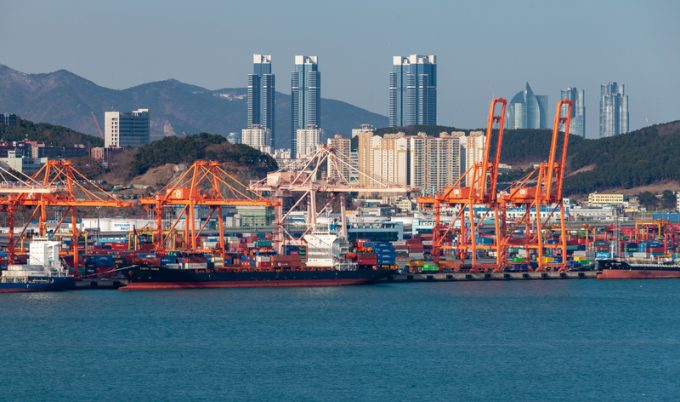Maersk opens Rotterdam cross-dock facility to accelerate cargo flow
Maersk has expanded its container supply chain services to European shippers with the launch of ...

South Korean port executives have revealed that low productivity and volumes have discouraged the Gemini Cooperation, MSC and Maersk Line from selecting its busiest container port, Busan, to be among their hub ports.
Instead, they have favoured Shanghai and Ningbo in China and Singapore.
At a recent conference, executives at Busan and South Korea’s second-busiest container port, Gwangyang, urged the government to do more to boost handling rates and cost competitiveness, instead of leaving this to the terminal operators.
Pusan Newport CEO Kwon Ki-hyun said: “Shipping companies have no choice but to withdraw ships when there is low volume. In South Korea, three to four cranes work on a ship, while overseas, eight to nine cranes attend to a ship, so there is a difference in port productivity.
“We need to find a way to increase container volumes by specialising in specific cargo, or raise transhipments in Busan to create economies of scale and improve cost competitiveness.
“We need to think at the government level, and not just leave it to terminal operators. In Shanghai, the port bureau operates the terminals and can provide many incentives to liner operators using the port.”
The Gemini Cooperation, to be formed by Maersk Line and Hapag-Lloyd in February, said containers on services from South Korea to Europe would be transhipped in Shanghai.
Yeosu Gwangyang Port Authority marketing manager Lee Kyung-ha said: “We were able to find out why Gemini chose Shanghai, Ningbo, Singapore and Tanjung Pelepas as transhipment hubs. Gemini has prioritised container volumes. Shanghai’s annual throughput exceeds 40m teu and Ningbo’s exceeds 30m teu. However, excluding transhipments, Busan’s imports and exports in 2023 came to just 10.74m teu.”
Sharing a conversation with MSC’s officials in the liner’s Geneva HQ, Mr Lee said: “MSC mentioned poor productivity in Busan. Last year, Singapore had a processing speed of 114 containers per hour, much faster than the 88 per hour in Busan.”
Cost competitiveness is another consideration, as Maersk affiliate APM Terminals has a 30% stake in Tanjung Pelepas. Mr Lee said: “Maersk Line has lost its dominance to MSC, but has chosen Tanjung Pelepas as a transhipment port as its cargo can be processed there.”
A Hapag-Lloyd spokesperson told The Loadstar having fewer port pairs was expected to improve schedule reliability.
He said: “By focusing each string on fewer key import and export ports, we significantly reduce the risk of delays along the journey, and we’re supplementing the core ocean network with an extensive shuttle network allowing for fast, direct, and reliable connections for other ports. Customers should see a positive change to schedule reliability, and they are not expected to experience major changes to transit times.”
Gemini’s service maps are being finalised and will be announced in due course, said a spokesperson.
Comment on this article